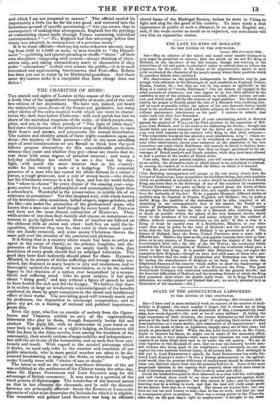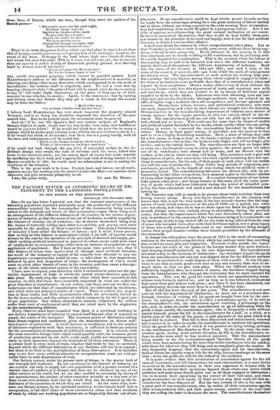STATE OF THE AGRICULTURAL LABOURERS.
TO THE EDITOR OP THE SPECTATOR.
Dumdrudge, 26th December 1843.
Sea—I have read in some statistical work an account of the number of land- holders in England : the exact number I forget, but it struck me as being very limited. On the education and disposition of this, a comparatively small class, how much depends!—the weal or wo of many millions. If, feehng the high importance of their situation, the owners determine to call forth the re- sources of the land, bow powerful for good ! if neglecting their duties, whether from inattention or a worse motive, how obstructive of all improvement! And here I do not speak of them as legislators, though many are of that class; but simply as possessors of land. When the late Lord LEICESTER, as Mr. CORE, began to improve his farms, be might not be aware of the secondary effect, but we can see it very plainly—that many more labourers are now profitably employed on those farms than used to be under the old system. We are so close together in this England of ours, that no man can honestly benefit him- self without also doing good to his neighbours; and conversely, no one can neglect his own business without injury to all around him. How strikingly is this put in Lord EOM-ROTOR'S speech, for Lord EBRINOTON has nobly fol- lowed Lord ASHLEY'S lead—" It was a strange phaenomenon in the agricul- tural world, that the greatest deficiency of employment should be observable in those very districts where there was the greatest field for it. Some of the most pauperized districts in the country were precisely those which most stood in need of draining and enclosing." This is surely cause and effect. Could the landholders point to their labourers as a class well fed, well lodged, and well clothed, there could be no more powerful argument against Anti- Corn-law or any other agitation: but this cannot be done; and the labourer, knowing that be is willing to work, and that the laud will yield ample profit for his labour, feels that he is wronged. The causes are beyond him; but two facts are but too well known to him—that he has no work, and that the land in consequence gives no produce. There was a strong article in the Times the other day, On the poor man's right to employment : it brought to my mtad
" See yonder poor n'er-bib uredwight, Soribject mean nod vile. Implore ban hrother of the earth To give him lea::: to toll : And see hi. lordiv I.r.ther worm The poor pentiou sem u. lbstriiaeful, though a o erpin2 wife Aud wretched cutouts mourn."
There is no more dangerous feeling which can find place in man's heart than Ibis of wrong—continuous wrong—depriving him of his birthright, bread by the sweat of his brow. Unhappy is the land whose high ones dread all change and whose low ones fear none. This is, I trust, not foresee 3 et ; but we cannot abut our eyes to a sullen feeling of •discontent gaining ground, and showing itself by wanton acts of mischief-
" Is yon red glare the Western star ? Nu, Is the beacon blase of war "- war, servile war against property, which cannot he guarded against. Lord Thatowtcue's address to the labourers in his neighbourhood is material, as allowing one thing—that many fires arise which are supposed to be the work of incendiaries : the address itself is singularly poor. To tell a man that by burning a farmer's ricks "the price of food will be raised, when he has no money to buy it," will make slight impression, as the price of food can be of little moment to one who has no money. Again, to the statement, that by ruining and driving away one farmer they may get a worse in his stead, the answer may be from the fable- " Quid retort urea Cui serviam clitellas dam purism meas."
I believe Lord HARDWICRE has very much improved the property around
W impole, and in so doing has doubtless improved the condition of the poor around him. But, to do general good, the movement most be general. And oh ! if he, our fair Queen's first and dearest subject, of England's farmers highest in rank, would lead the way in tbi-, how many now indifferent would be eager to follow ! If he would but think how the poor live in many a cottage which he dashes past, (during a run of forty minutes without a cheek.)— if' e would but think of its inmates, that there too is a young family, with all itsoares and endearments—if he would but
"Think of th' human heart by which we live,
Think of its teuderneas, its hopes. aud fears "—
iflae could but look through the gay vista of triumphal arches to the in- dividual drudge who- swells the note of .welcome with his votes, follow him home to his cheerless abode, see his scanty meal of coarse fare made scantier by sacrificing one day's work and wages to the loyal wish of doing honour to his Queen—could be do this, he would need - no exhortation to am in raising the condition of the labourer.
This is the great work to be done. Capital, land, and labour, are all ready, separate as yet, but needing only the master-hand—the Man—to combine these elements, and give increased-prosperity to all.
those lines of BURNS, which are true, though they want the pathos of his ant& poems-































 Previous page
Previous page